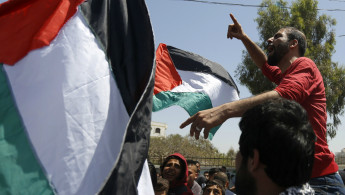Protest for reconcilliation cleared in Gaza
The demonstration was called on Facebook by a movement calling itself "April 29", which is campaigning for reconciliation between Hamas and Fatah - and protesting against the stalling of Gaza reconstruction, and the continued closure of the Rafah border crossing.
Fatah, which controls the West Bank through its dominance of the Palestinian Authority, and Hamas, in power in the Gaza Strip, have come to a deadlock in the negotiations which have been taking place intermittently since an outline unity deal was agreed in June.
The protest took place on Baghdad Street in Shujaiya, one of the areas hit hardest by the 2014 Gaza war, in which some 2,200 Palestinians were killed.
Protesters complained of both Hamas and Fatah disrupting the gathering by chanting their respective movements' slogans against each other. After changing location, men armed with clubs hit protesters, clearing the demonstration.
"Hamas and their members did not officially interfere, but sent supporters to break up the gathering," said Ibhrahim Omar. There are conflicting accounts of whether those who broke up the protest were plain-clothed security forces or lay supporters of the movement.
"There was extensive beating, arrests and insulting words," said 23-year-old Haneen al-Qadi. "Journalists were targeted."
Cameras were smashed and others confiscated, said a statement from the April 29 group.
Eyyad al Bazm, spokesperson for the ministry of interior in Gaza, announced on Facebook that protesters had received permission to protest, but started fighting among themselves - so police "intervened" in order to preserve public order.
Deteriorating conditions
Although the protest was small, it reflects the disillusionment of many young Gazans who, after surviving a horrific war, are now trapped in a political stalemate between Hamas and Fatah, which they view as delaying the rebuilding of the coastal strip.
"This has been a demand for eight years, but has become more urgent now due to the problems that we are facing," said Omar. "From tunnels, to electricity, to food supplies, to the war... The people want a solution."
The popularity of Hamas generally increased across the occupied territories in the wake of the Gaza war, but declined recently, as the independent Palestine Centre for Policy and Survey Research showed in a March poll.
Some 39 percent of Palestinians back Hamas; a three point lead over Fatah, the poll concluded.
However, some young Gazans, while supporting those who were fighting against Israel, now fear that the 2014 war caused too much destruction for little gain. The same poll estimated that 60 percent of Gazans were dissatisfied by the conflict's results.
"I'm with the resistance, but they must resist for my country and people and not for their partisan interests," said 20-year-old demonstrator Ahmed Yehia, who also criticised Fatah for its security co-ordination with Israel in the West Bank.
Omar maintains that Hamas should have stuck to its original "resistance" role. "Hamas lost a lot of popularity and respect after it entered formal politics," he said.
Hassan Mourtaja, 21, who helped organise the protest on social media, said that Hamas had a presence in all aspects of life in the Gaza Strip. "But they have to be careful not to become politically isolated. They have to achieve a real unity."
Like many demonstrators, Mourtaja described on-going division as a "major reason" for the slow pace of reconstruction, along with the continuing blockade of the Gaza Strip, enforced by Israel and Egypt.
Rebuilding a divided Gaza
There are debates about how much the Fatah-Hamas split has affected the flow of aid to Palestinians.
Analysts Sultan Barakat and Omar Shaban of the Brookings Institute said the difficulties persist due to the reluctance of the international community and donors to deal with Hamas - still viewed as a terrorist movement by the US.
Therefore, most of the plans for the reconstruction of Gaza must be carried out through the Palestinian Authority - which is unable to, due to negligible presence and influence in Gaza.
"The most critical dilemma facing the reconstruction efforts of Gaza is one of legitimacy and control," they wrote in a briefing.
However, this broader context is of secondary concern to many frustrated young Gazans - some of whom have scholarships abroad and are trapped in the coastal enclave.
"Gaza reconstruction has stopped because Hamas still controls the borders in Gaza. I think that this issue will be fixed if Hamas gave the PA control over the borders," said Ahmed Lafi, 21.
The Times of Israel also reported that the PA was withholding reconstruction funds from Gaza until it gains control over Rafah crossing.
The April 29 movement echoes the larger March 15 movement which emerged in 2011 in Gaza, which also aimed to "end the division" between Hamas and Fatah.
Although it attracted large numbers, it was also quickly shut down by Hamas, and organisers are now unsure of their aims.
"What we truly wanted was to raise banners which read, 'Down with the regimes of the West Bank and Gaza'," activist Ahmed Belousha told al-Monitor in 2013.
Although Ahmed Lafi agrees with the rest of the April 29 demands, "any reconciliation would be meaningless and would soon collapse, like the previous times".
Hamas meanwhile, held a press conference on Thursday, denouncing the arrest of their members in the West Bank, with PA security forces detaining 75 so far this month.
* The names and ages in this article have been changed to protect those interviewed.





 Follow the Middle East's top stories in English at The New Arab on Google News
Follow the Middle East's top stories in English at The New Arab on Google News


